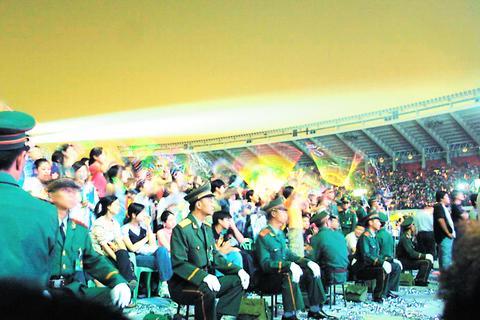If only Pop Stop could have been in Beijing last weekend for Jay Chou's (周杰倫) stadium concert. The show sounds like a comedy of the type only China is capable of cooking up.
Showing a distinctly mainland-Chinese penchant for projects on a massive scale, the organizers set up an enormous stage covering half the Beijing Workers' Stadium, which can seat 85,000 people. So normally that would mean that about 40,000 people could enter. But, not surprisingly, thousands of people had purchased fake tickets for seats located in roped-off areas or somewhere under the stage. They were allowed into the venue but thousands ended up standing in the aisles.
The Workers' Stadium tends to bring out the worst in Beijing's rowdy soccer fans and that unseemly tradition seemed to rub off on Jay's fans when they started pelting him and the dancers with glow sticks during a, by all accounts, stirring rendition of an old Teresa Deng (鄧麗君) song. Luckily for Jay things weren't likely to get any more violent than that because local authorities had mobilized around 5,000 officers from the Public Security Bureau, the notoriously rough Chinese police force, to keep everyone in line. The security presence may seem a bit heavy handed, but then it's China, where hyped-up crowds have overthrown regimes many times before. And you can never be too cautious with those unruly teeny boppers.

PHOTO: TAIPEI TIMES
In Shanghai, meanwhile, a Taiwanese star of a different kind has wandered into local people's crosshairs. Chu Mei-feng (璩美鳳), the former director of Hsinchu County's cultural affairs bureau and the central figure in a salacious sex, lies and videotape scandal that earned her world-wide fame two years ago, has been accused by Shanghai media of having been admitted to Fudan University's business administration doctoral program through favoritism instead of good test scores. Local media published her test results, which in three key test subjects didn't exceed 50 percent. Chu and the school insist the admission is fair -- even for people who've had their lovemaking filmed and spread around the world on the Internet.
It seems a lot of strange things happen on the Internet. Pop Stop's favorite whipping boy Nicholas Tse (謝霆鋒) committed suicide this week, if we're to believe China's popular NetEase Web site. The site reported that the singer/actor had jumped off the 34th floor of a building in Hong Kong's Central district to his death. According to Apple Daily, when told about the mistake, Nicholas had only this to say: "If I died, who would show up at the memorial concert for Leslie Cheung (張國榮)."
In another display of the power of the Internet, A-hsian (阿賢), the male actor in the Taiwan Plumber (台灣水電工) porno, which is frequently described as the first hard-core Taiwanese porn movie, has started selling his own second-hand clothes on Yahoo's auction site, hoping his fans will pay top NT dollar to wear his briefs. He's also planning to release a nude photo collection book next month.

Speaking of porn, several local papers reported this week on a film company that recently released a smut film featuring "A-mei" (阿妹). Of course, the diva we commonly associate with that name isn't the A-mei featured in the movie, but the published stills bear an uncanny resemblance. In reality, the actress is Japanese.
If you want to see the real A-mei, along with Sun Yanzi (孫燕姿), eVonne (許慧欣), Vivian Hsu (徐若瑄) and Jackie Cheung (張學友), then head down to CKS Memorial Hall tomorrow night at 7pm for a benefit concert to celebrate TVBS's 10-year anniversary. This will be Yanzi's last concert before she steps out of show business for a year, as announced last month.

From the last quarter of 2001, research shows that real housing prices nearly tripled (before a 2012 law to enforce housing price registration, researchers tracked a few large real estate firms to estimate housing price behavior). Incomes have not kept pace, though this has not yet led to defaults. Instead, an increasing chunk of household income goes to mortgage payments. This suggests that even if incomes grow, the mortgage squeeze will still make voters feel like their paychecks won’t stretch to cover expenses. The housing price rises in the last two decades are now driving higher rents. The rental market

July 21 to July 27 If the “Taiwan Independence Association” (TIA) incident had happened four years earlier, it probably wouldn’t have caused much of an uproar. But the arrest of four young suspected independence activists in the early hours of May 9, 1991, sparked outrage, with many denouncing it as a return to the White Terror — a time when anyone could be detained for suspected seditious activity. Not only had martial law been lifted in 1987, just days earlier on May 1, the government had abolished the Temporary Provisions Effective During the Period of National Mobilization for Suppression of the Communist

Hualien lawmaker Fu Kun-chi (傅?萁) is the prime target of the recall campaigns. They want to bring him and everything he represents crashing down. This is an existential test for Fu and a critical symbolic test for the campaigners. It is also a crucial test for both the Chinese Nationalist Party (KMT) and a personal one for party Chairman Eric Chu (朱立倫). Why is Fu such a lightning rod? LOCAL LORD At the dawn of the 2020s, Fu, running as an independent candidate, beat incumbent Democratic Progressive Party (DPP) lawmaker Hsiao Bi-khim (蕭美琴) and a KMT candidate to return to the legislature representing

Fifty-five years ago, a .25-caliber Beretta fired in the revolving door of New York’s Plaza Hotel set Taiwan on an unexpected path to democracy. As Chinese military incursions intensify today, a new documentary, When the Spring Rain Falls (春雨424), revisits that 1970 assassination attempt on then-vice premier Chiang Ching-kuo (蔣經國). Director Sylvia Feng (馮賢賢) raises the question Taiwan faces under existential threat: “How do we safeguard our fragile democracy and precious freedom?” ASSASSINATION After its retreat to Taiwan in 1949, the Chinese Nationalist Party (KMT) regime under Chiang Kai-shek (蔣介石) imposed a ruthless military rule, crushing democratic aspirations and kidnapping dissidents from